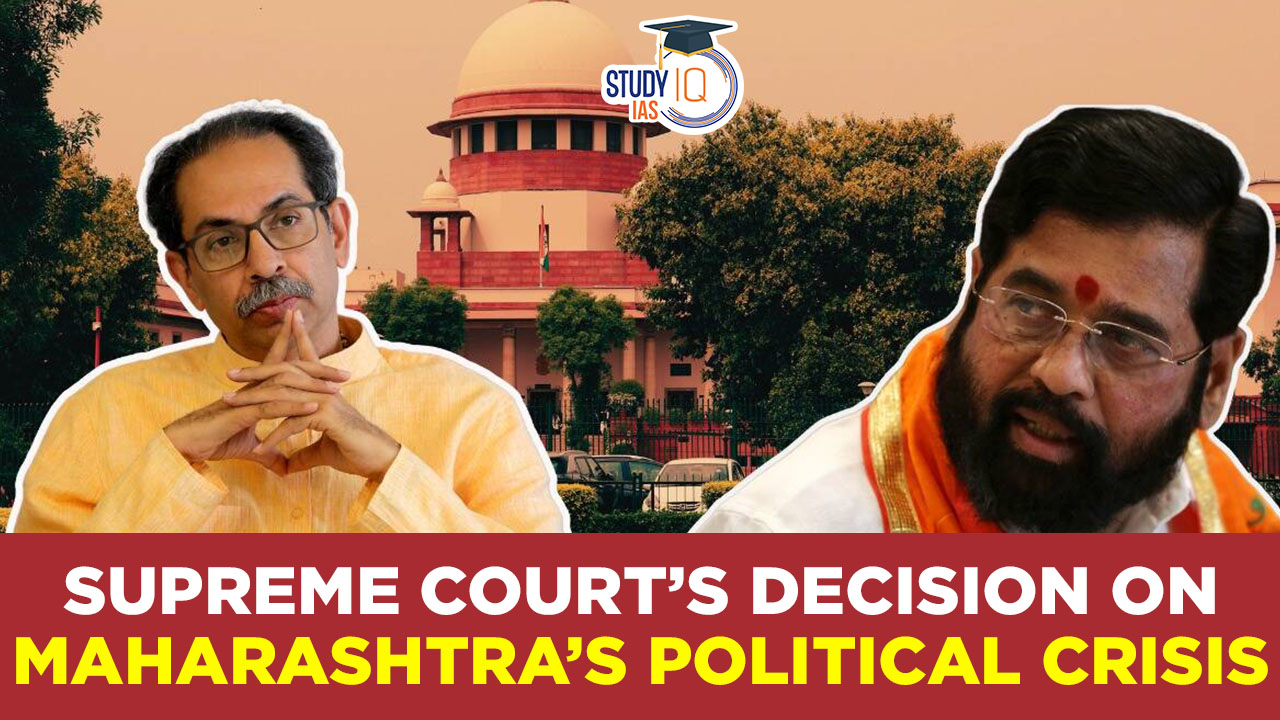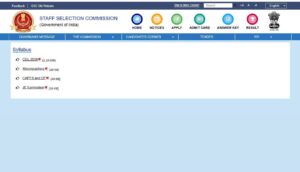Table of Contents
Context: The Supreme Court has delivered its verdict on the various issues related to the 2022 Shiv Sena crisis in Maharashtra.
More on the News
- The apex court made strong observations on the role of the then Governor of Maharashtra and the Speaker of the Legislative Assembly.
- However, the court refused to interfere in the proceedings related to disqualifying 16 MLAs, including now Chief Minister Eknath Shinde.
- The court also said that Governor was right in inviting Mr. Shinde to form the new government as Mr. Thackeray had resigned before the floor test.
- The court also refused to invalidate the election of the Speaker just because some of the participating MLAs faced disqualification proceedings.
Background: The Maharashtra Crisis

Key Highlights of the Verdict
| Petition on Disqualification | The court said that disqualifications under the Tenth schedule of the constitution, under the anti-defection law must be carried out by the speaker.
There were “no extraordinary circumstances” in the current case warranting the court adjudicating in the matter. The court further added that a MLA has the right to participate in House proceedings regardless of pendency of any petitions for disqualification. |
| Speaker’s role in determining the real faction | The speaker must have considered the constitution of the Shiv Sena, which was submitted to the Election Commission (EC), while deciding which faction was the “real” Shiv Sena.
Since the Paragraph 3 of the Tenth Schedule has been removed, a one-third ‘split’ in party to form a separate group, will no longer be protected. The Court has asked the Speaker to first determine the real faction of the political party and take the call without being influenced by the ECI order in that regard. The speaker’s decision must not be based on “blind appreciation” of which group had a majority in the Assembly. The structure of leadership outside the Legislative Assembly must also be considered. On speaker’s decision of staying disqualification proceedings, the court observed that decision of the ECI cannot be relied upon by the Speaker for adjudicating disqualification proceedings. ECI’s recognition of the Shinde faction as the real Shiv Sena would take effect only “prospectively” and should not affect disqualification proceeding against the MLAs. |
| Governor’s actions | The then Governor did not act according to the law by calling for a floor test, as he did not have objective material that showed that the incumbent government had lost the confidence of the House.
The Governor acted on the inference that a section of the Shiv Sena legislators wished to withdraw their support to the government, even though they did not explicitly express. The Governor’s powers to act without the aid and advice of the Council of Ministers is of an extraordinary nature, and has to be exercised with circumspection within the limits of law. The Governor must refrain from playing a role in inter or intra party disputes. |
| Re-instating the government | On the plea to re-instate the government led by Uddhav Thackeray, the Court said that the Chief Minister had resigned voluntarily without facing the floor test.
Despite the Governor’s action of seeking floor test was not in accordance with the law, the court cannot quash a resignation submitted voluntarily. |
| Appointment of party whip | The faction led by Eknath Shinde passed a resolution to remove existing whip Sunil Prabhu and appoint Bharat Gogawale in his place.
After assuming office, the Speaker recognised Gogawale as the whip without attempting to identify which of the two persons were authorized by the political party. The decision to recognize Gogawale as the whip was to be illegal, as he had not verified if it was the decision of the political party. |
| Distinction between legislature and political party | The Eknath Shinde faction argued that the legislature party and the political party are inextricably intertwined. But the court said that an association of individuals calling itself a political party has to be registered with the EC.
The independent existence of a legislature party is only limited to the extent of providing a defence to actions of legislators of the political party when it comes to freedom of expression. It further added that it is the political party and not the legislature party which appoints the Whip and the Leader of the party in the House. Hence the speaker must recognise only the whip and leader who are duly recognised by the political party. |
| Concurrent adjudication by Speaker and EC | The Court refused to entertain argument of Thackeray faction that the EC was barred from deciding on the party symbol issue until the Speaker decided the disqualification pleas.
It would amount to indefinitely staying ECI’s proceedings, as the Speaker’s decision will be settled only after the appeals against his decision were disposed of. |
| Referring Nabam Rebia case to larger SC Bench | The court decided to refer certain issues related to its 2016 judgment in the Nabam Rebia case to a larger Bench.
One of the issues was whether a notice for removal of a Speaker would restrict his/her powers to issue disqualification notices to MLAs. |
Nabam Rebia Case, 2016
- The Court in 2016 had ruled that Speaker of a House cannot decide a disqualification petition filed under the anti-defection law while a notice under Article 179(c) for the Speaker’s removal is pending.
- The court added that Governor’s powers to summon, dissolve and advance a session will come under the scope of judicial review. The Governor was bound by aid and advice of the Council of Ministers.


 Kailash Mansarovar Yatra to Resume Soon,...
Kailash Mansarovar Yatra to Resume Soon,...
 What is Tensor Processing Unit (TPU)?
What is Tensor Processing Unit (TPU)?
 SSC CGL Syllabus 2025 for Tier 1 and Tie...
SSC CGL Syllabus 2025 for Tier 1 and Tie...





















